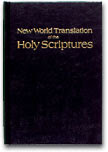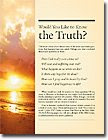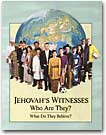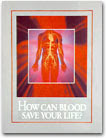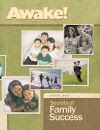I collect different Bible translations. I have 32 different versions (with more on the way), ranging from the New International Version to the Ferrar Fenton Bible, from the Holman Christian Standard Bible to the 1560 Geneva Bible. Some of them are pathetic attempts to sound contemporary and should not have the word Bible applied to them (The Message; The Living Bible) to versions that are faithful renderings of the Scriptures as a whole. One Bible, The New World Translation, has been criticized because of its unorthodox renderings of certain verses (John 1:1; Titus 2:13) but I have found is extremely accurate, despite the supposed background of the anonymous translators. People criticize the entire NWT when it is absolutely not a very bad Bible. It just goes against the majority and what people want to see. The main problem that I can see with the NWT is its overt literalness. Sometimes it can be difficult to read because of how literal it is. When you want to know what the Greek and Hebrew are saying, though, without having to read the Greek and Hebrew, I would recommend the NWT if you can overlook the verses that people constantly point to.
Two other Bible's that I feel are very good are the New American Standard Bible and the English Standard Version. The criticism that I have with those Bibles is the fact that they do not have the Divine Name, whether it is written, Jehovah or Yahweh. To take out the Name that appeared more then any other name in the Bible (including Abraham, Moses, David, and Jesus) is a disgrace to God who told Moses that this was His Name for all time. Now, one Bible that I would recommend that uses the Divine Name (albeit only a few times) is the Holman Christian Standard Bible. The name Yahweh is used a handful of times whenever the verses emphasizes the Name of God.
Now, when looking at Bibles, the first verse I turn to is Exodus 3:15 because if a Bible does have the Divine Name, that is where you are most likely to find it. When I find a Bible that does have this, even once, it is doing a good deed. Joel 2:32 says that anyone who calls on the Name of Jehovah (or Yahweh) will be saved. However, how can we call on a God whose Name we do not know?
One Bible that did not have the Divine Name at all in its first printing was the paraphrased Bible, the New Living Translation. Then, in the 2004 revision, the Name Yahweh was added into three to four verses. That is not nearly enough because the Name appears nearly 7,000 times in the original manuscripts of the Bible.
This blog is not an evaluation of Bible's that contain the Divine Name. It is an evaluation of versions in general. Most Bible's fall into one of three categories in their translation theories. The first is Formal Equivalence Translation (or word-for-word), Dynamic Equivalence Translation (or thought-for-thought), and paraphrase (or whatever the translator feels the Bible says). Now, two DET's that are popular today are the above mentioned New Living Translation and the Today's English Version. I like to categorize those two Bible's in the paraphrase area of the translation type spectrum because of how much of a DET they actually are.
When giving an example of a big mistake in the New Living Translation, I like to quote Philippians 2:5-6 which says in the NASB (which translates the verse accurately):
"Have this attitude in yourselves which was also in Christ Jesus, who, although He existed in the form of God, did not regard equality with God a thing to be grasped."
This is how the NLT paraphrases this verse (with mistranslations underlined):
"You must have the same attitude that Christ Jesus had. Though he was God, he did not think of equality with God as something to cling to."
Do you see the difference? The NASB has the correct translation of the verse, which can be interpreted in many different ways. The NLT has interpreted the verse for you. While many will not criticize how the NLT has the verse because they feel like it carries over the correct meaning, not all can agree. A Bible should not interpret the Word, but give it to you just as Paul wrote it because what if the NLT translators are wrong? While many will not think that, there is always the possibility, which means that they need to be careful.
One version that I commended which does have its bad points is the HCSB. They have this verse as (with mistranslation underlined):
"Make your own attitude that of Christ Jesus, who, existing in the form of God, did not consider equality with God as something to be used for His own advantage."
That is just as bad as what the NLT did, although they don't try to pull off something that big very often. However, you can see the bias that has leaked through in that verse in both of those translations. Bible translators need to realize that, if left alone, readers will read a verse exactly the way they (the translators) hope they will read it if they already hold the same viewpoint.
One other point that I want to discuss is the use of the apocrypha in modern Bibles. The Catholic Bible versions all have these books. The books in question (1 and 2 Maccabees, Judith, Tobit, Sirach, Wisdom, additions to Esther, Susanna, Bel and the Dragon, Song of the three Hebrews--I may not have listed all of them, forgive me if I missed a couple.) Should these be in there? Most protestants would agree that they do not. Catholics would say that they are inspired to a lesser degree. Whatever the case, what is writen in them should argue the point for itself. Would I recommend reading them? I would read them myself. I enjoy reading extra-biblical texts. The apocrypha, gnostic, etc. They sure are fun. I will say personally, that I do not agree that these text are inspired even to a lesser degree. I am not Catholic. I am happy that they are not in my Bible that I personally use but I do have Bibles that include them (New Jerusalem Bible; New American Bible). Before I close, I want to commend the NJB for their usage of the Name, Yahweh, all 6,500+ times that it appears.
There are many Bible's on the shelves, if you want one that is easier to read but less trustworthy, go for a Dynamic Equivalence. If you want a Bible that is a little harder to read but more trustworthy, go for a Formal Equivalence. I must warn, friend, stay away from the paraphrases.*
*Below is a list of Bible translations and what category they fall under. (These are all Bible's I own)
Formal Equivalence
1. Revised Standard Version
2. King James Version
3. New American Standard Bible
4. English Standard Version
5. New King James Version
6. Amplified Bible
7. New English Bible
8. New World Translation
Dynamic Equivalence
1. Modern Language Bible
2. God's Word Translation
3. New International Version
4. Today's New International Version
5. New Life Version
6. Holman Christian Standard Bible
7. New Century Version
8. New English Translation
9. Easy-to-Read Version
10. New Jerusalem Bible
11. New Revised Standard Bible
12. New American Bible
13. International Children's Bible
Paraphrase
1. Today's English Version
2. New Living Translation
3. The Living Bible
4. The Message Bible
5. New International Reader's Version
6. Contemporary English Version
Not Sure
1. Complete Jewish Bible
2. George Lamsa Bible
3. The Bible in Living English
4. Ferrar Fenton Bible
5. Geneva Bible
"This is the Way, walk in it, you people."-Isaiah 30:21
Blog Archive
Your Personal Invitation
Websites of Interest
Other Jehovah's Witness Sites
- Our Spiritual Heritage
- How Theology and Bias Affect Bible Translation
- In Defense of the New World Translation
- Bible Translation and Study
- Jerusalem 607 B.C.E.
- Theocratic Resources
- Jehovah's Witnesses United
- The Jehovah's Witnesses and the United Nations
- Setting the Record Straight
- JW Brothers
- Face the Facts
- Quoted Statements
- David Silver's Website
- Serving Jehovah in Foreign Lands
Other Jehovah's Witness Blogs
Videos of Interest
Various Sign-Language Videos (Would You Like to Know the Truth?)
- American Sign Language
- Australian Sign Language
- Brazilian Sign Language
- British Sign Language
- French Sign Language
- German Sign Language
- Greek Sign Language
- Italian Sign Language
- Japanese Sign Language
- Korean Sign Language
- Mexican Sign Language
- Portuguese Sign Language
- Russian Sign Language
- Spanish Sign Language
All of the books appearing below are distributed for FREE by Jehovah's Witnesses. They are all based on the Bible and should not be read without the Holy Word so as to prove to yourself that what is contained in these books are actually Bible-based. Contact Jehovah's Witnesses locally in your area or write to the appropriate address found at the "Official Website of Jehovah's Witnesses" linked above.
New World Translation of the Bible (Clickable Picture)
Would You Like to Know the Truth? (Clickable Picture)
What Does God Require of Us? (Clickable Picture)
Jehovah's Witnesses--Who Are They? What Do They Believe? (Clickable Picture)
Look! I Am Making All Things New (Clickable Picture)
Should You Believe in the Trinity? (Clickable Picture)
When Someone You Love Dies (Clickable Picture)
How Can Blood Save Your Life? (Clickable Picture)
What Does the Bible Really Teach?

Explains the Basic Teachings in the Bible
Keep Yourselves in God's Love

Used in Bible studies with advanced students, this book explains practices to avoid so as to remain in God's favor
Draw Close to Jehovah

Explains the Four Dominant Qualities of God and How They Draw Us to Him
The Greatest Man Who Ever Lived
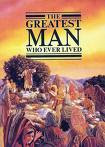
Takes the Life of Jesus Christ from the Four Gospels and Presents them in Chronological Order
Come, Be My Follower
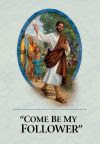
Explains Who Jesus Is and Why We Should Follow His Example in Our Daily Life
Pay Attention to Daniel's Prophecy

Explains the Book of Daniel in a Verse-by-Verse Format and Shows How His Book Has Meaning For Us Today
Live With Jehovah's Day in Mind
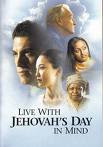
Takes an In-Depth Look at the Twelve "Minor" Prophets and Shows How Their Writings Benefit Us Today
The Secret to Family Happiness

Shows From the Bible What Families Can Do to Survive in This World Today
My Book of Bible Stories
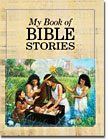
Takes the Most Famous and Loved Stories From the Bible and Presents Them for Children--Fully Illustrated
Is There a Creator Who Cares About You?

Using the Latest Understanding in the Scientific Field and the Bible to Prove That There is a Creator
Mankind's Search for God
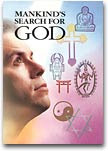
Gives an Overview of all the Major Religions of the World Including Islam, Judaism, Hinduism, Buddhism, and More
Knowledge That Leads to Everlasting Life

This is an older book that was at one time used by Jehovah's WItnesses to teach basic Bible doctrine
Jehovah's Witnesses--Proclaimers of God's Kingdom

This book presents the entire modern-day history of the Jehovah's Witnesses and their organization up until the year of publication--1993
All Scripture Is Inspired of God and Beneficial
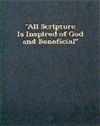
A Book That Gives a Brief Review of Each Book of the Bible, Examines the History of Each Book, Why It Was Written, and More!
Insight on the Scriptures
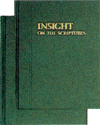
A Two-Volume Bible Encyclopaedia That Explains Every Person, Place, Thing, and Event in the Bible
The Watchtower Magazine
The Awake! Magazine
Jehovah God
Jesus Christ
- Jesus Christ-Who Was He?
- Is Jesus Christ God?
- A Birth to Be Remembered
- Lessons Jesus Taught-Are They Practical?
- Jesus' Miracles--Fact or Fiction?
- Reliving Jesus' Last Days on Earth
- The Resurrection of Jesus-Fact or Legend?
- Jesus Saves--How?
- How Jesus Can Change Your Life
- Christ's Coming-How Does It Affect You?
The Bible's Viewpoint
- What Was the Original Sin?
- What Happens at Death?
- Should You Pray to the Virgin Mary?
- Should Icons Be Used In Worship?
- Should Christians Expect Divine Protection?
- Prayers That Are Heard By God
- Is There Only One True God?
- Is the Holy Spirit a Person?
- Is It Wrong to Drink Alcoholic Beverages?
- Do Humans Become Angels When They Die?
- Does the Bible Discriminate Against Women?
- Does Science Contradict the Creation Account?
- Does God Approve of Same-Sex Marriage?
- Did Jesus Really Die on a Cross?
The Bible in Your Life
- What Hope for the Poor?
- Keep Your Children Safe!
- Why Care About Spiritual Things?
- Blood--Why So Valuable?
- Enjoy Family Life
- How Can You Find Inner Peace?
- Should You Live Only For Today?
- How Can You Benefit From Godly Principles?
- You Cannot Save It, So Use It Well
- Building on Pagan Foundations
- Hope--Where Can You Find It?
Biblical Answers to Questions Young People Ask
- Why So Many Rules?
- Why Does God Let Us Suffer?
- What's Wrong With Premarital Sex?
- How Can I Stop the Gossip?
- How Can I Help Those In Need?
- How Can I Cope When Trajedy Strikes?
- How Can I Avoid Getting Involved With the Wrong People?
- Homosexuality--How Can I Avoid It?
- Dabbling in the Occult--What's the Harm?
Visitors
The Bible says, "The heavens declare the glory of God; the skies proclaim the work of his hands." (Psalm 19:1) When we consider the marvelous works of our God, it should move us to "bend [our] knees" to Him. (Ephesians 3:14) Let us all be moved to thank our God and Father for all he has done for us. In the words of King David: "Every breathing thing--let is praise Jah. Praise Jah you people!"-Psalm 150:6

